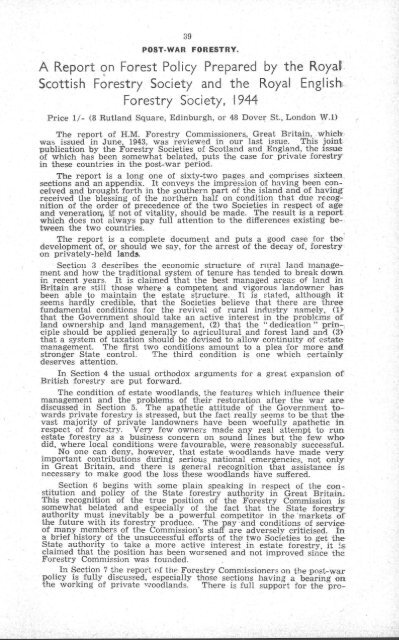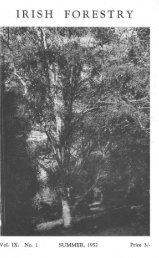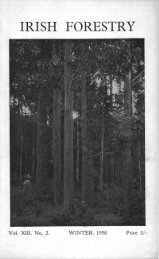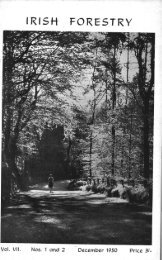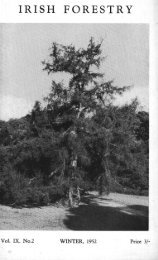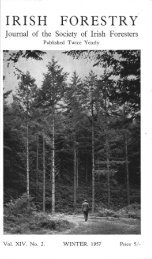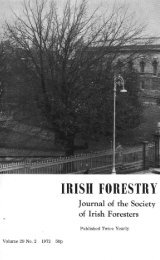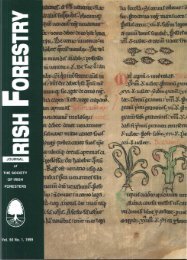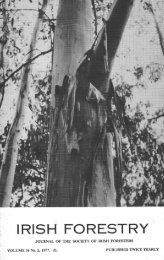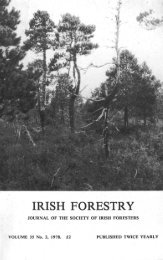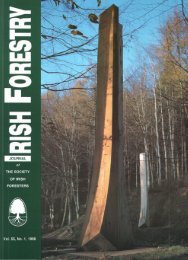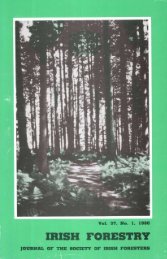39POST·WAR FORESTRY.A Report on Forest Policy Prepared by the RoyalScottish F~restry <strong>Society</strong> and the Royal EnglishForestry <strong>Society</strong>,1944Price 1/- (8 Rutland Square, Edinburgh, or 48 Dover St., London W.l)<strong>The</strong> report <strong>of</strong> H.M. Forestry Commissioners, Great Britain, which:·was issued in June, 19113, was reviewed in our last i~sue. This jointpublication by the Forestry Societies <strong>of</strong> Scotland and England, the issue<strong>of</strong> which has been somewhat belated, puts the case for private forestryin these countries in the post-war period.<strong>The</strong> report is a long one <strong>of</strong> sixty-two pages and comprises sixteen,sections and an appendix. It conveys the impression <strong>of</strong> having been conceivedand brought forth in the southern part <strong>of</strong> the island and <strong>of</strong> having'received the blessing <strong>of</strong> the northern half on condition that due recognition<strong>of</strong> the order <strong>of</strong> precedence <strong>of</strong> the two Societies in respect <strong>of</strong> ageand veneratioIl/, if not <strong>of</strong> vitality, should be made.. <strong>The</strong> result is a report:which does not always pay full attention to the differences existing betweenthe two countries.<strong>The</strong> report is a complete document and puts a good case for the-'development <strong>of</strong>, or should we say, for the arrest <strong>of</strong> the decay <strong>of</strong>, forestryon privately-held land,.Section 3 describes the economic structure <strong>of</strong> r1lral land managementand how the traditional system <strong>of</strong> tenure has tended to break downin recent years. It is claimed that the best managed area~ <strong>of</strong> land inBritain are still those where' a competent and vigorous landowner hasbeen able to maintain the estate structure. It is r.tated, although itseems hardly credible, that the Societies believe that there are threefundamental conditions for the revival <strong>of</strong> rural inrlmtry namely, (l}that the Government should take an active interest in the problems <strong>of</strong>land ownership and land management, (2) that the .. dedication" prin-.ciple should be applied generally to agricultural and forest land and (3)that a system <strong>of</strong> taxation should be devised to allow continuity <strong>of</strong> estatemanagement. <strong>The</strong> first two conditions amount to a plea for more andstronger State control. <strong>The</strong> third condition is one which certainlydeserves attention.In Section 4 the usual orthodox arguments for a great expansion <strong>of</strong>British forestry are put forward.<strong>The</strong> condition <strong>of</strong> estate woodlands, the features which influence theirmanagement and the problems <strong>of</strong> their restoration after the war arediscussed in Section 5. <strong>The</strong> apathetic attitude <strong>of</strong> the Government towardsprivate forestry is stressed, but the fact really seems to be that thevast majority <strong>of</strong> private landowners have been woefully apathetic inrespect <strong>of</strong> fore~try. Very few owners made any real attempt to runestate forestry as a business concern on sound lines but the few whodid, where local conditions were favourable, were reasonably successfuLNo one can deny, however, that estate woodlands have made veryimportant contributions during serious national emergencies, not onlyin Great Britain, and there is general recognition that assistance isnecessary to make good the loss these woodlands nave suffered.Section I) begins with some plain speaking in respect <strong>of</strong> the con ·.stitution and policy <strong>of</strong> the State forestry authority in Great Britain~This recognition <strong>of</strong> the true position <strong>of</strong> the Forestry Commission issomewhat belated and especially <strong>of</strong> the fact that the State forestryauthority must inevitably be a powerful competitor in the 'markets <strong>of</strong>the future with its forestry produce. <strong>The</strong> pay ' and conditions <strong>of</strong> service<strong>of</strong> many members <strong>of</strong> the Commission's staff are adversely criticised. Ina brief history <strong>of</strong> the unsuccessful efforts <strong>of</strong> the two SOcleties to get theSta.te authority to t?-~e a more active interest in estate forestry, it :1f:claImed that the pos1tIon has been worsened and not improved since theForestry Commission was founded .. In ?ection 7 t.he report <strong>of</strong> th!, Forestry Commissioners on the ·post-warpolIcy 1S fully d1scussed, espec1ally those sections having a bearin" onthe working <strong>of</strong> private "/oodlands. <strong>The</strong>re· is full support for the pro-
~oposal to increase the forest area, to allocate grants to forestry and forthe" dedication" scheme. <strong>The</strong> constitution <strong>of</strong> the post-war forest authorityand the policy in respect <strong>of</strong> s!llall "foods is opposed, 2nd modificationsin respect <strong>of</strong> proposals for State ;J.sslstance, marketmg, educatIOn,. researchand for dealing with pests are considered necessa.ry. <strong>The</strong> failure<strong>of</strong> the Commissioners to adopt a policy in respect <strong>of</strong> securIng and growmgthe best strains <strong>of</strong> various species <strong>of</strong> trees and to, deal with the problem<strong>of</strong> valuation <strong>of</strong> standing timber and 'immature plantations is commentedllpon.<strong>The</strong> remaining sections deal with recommendations which the Societiesmake &nd these may be summarised as follows. It is proposed that theexisting Forestry Commission s!lOuld be replaced by a new for.estryauthority responsible to a Minister and composed <strong>of</strong> a Board with aPresident the latter to be represented by an active chairman, who mustnot be a 'technical <strong>of</strong>ficer. <strong>The</strong> BO'lrd is to include four paid technical 'members and five unpaid members. Two <strong>of</strong> the technical members areto be responsible, with a separate staff. for estate woodlands and theother two for State woodlands. <strong>The</strong> country i~ to be divided into twentyor thirty regions' each under d \ ~onservator to be assisted by a regional .forestry committee, appointed in part by the forestry authority and inpart by the Forestry Societies. Obviously this elaborate scheme <strong>of</strong>control is hound to be cumbrous and unwieldy in the extreme and couldonly be applied, if at all, by tDe English end <strong>of</strong> the i'land. It is indeedthe very antithesis <strong>of</strong> the -autocratic control hitherto in force and nodoubt some compromise will have to be reached. A determined effort'should be made to bring .; small woods" into the dedication scheme.Dedicated woodlands would not be subject to lkence. More favourableplanting grants are considered necessan' and grants for clearing scr'.lband debris. Decontrol <strong>of</strong> existinf.: controlled prices for standing timberis advocated or else a material increase in the existing maximum prices.<strong>The</strong> need for improved pay and conditions <strong>of</strong> s€rvice <strong>of</strong> men in theforestry pr<strong>of</strong>ession generally is stressed. A considerably expanded education~cheme is advocated and an expansion <strong>of</strong> expenditure to not lessthan £150,000 a year by the end cf the fourth year on research work isproposed. <strong>The</strong>se last proposals seem to err on thz side <strong>of</strong> exaggeration.Finally recommendations are put forward for extermination <strong>of</strong> rabbits,squirrels and roe deer, based on certain assumptions whkh are at leastopen to que,tion.When one has read this report O:1e is left with the feeling that thereis a· fundamental difference <strong>of</strong> outlook between those engaged on Stateafforestation on the one hand and the heirs <strong>of</strong> those who bave "ngagedin private forestry in the past on the other. That there should be politicaldifferences <strong>of</strong> opinion one can understand but there certainly shouldnot be that wide gulf between the day-to-day fo!"estry work which goeson in private forests and that which is carried out in Government forest6.<strong>The</strong> trouble seems to be almost entirely due to those responsiblefor State forestry acting 0'1 the assumption that the new Stllte fO~'estsnow being created are going to be something entirely different to anyso far seen in these islands; to a deliberate attempt to build up ideal, selfcontainedforest units out <strong>of</strong> touch with the communities by which theyare ~urrounded and certainly out <strong>of</strong> touch with existing .; local" forests.If the State authorities could accept as a fact that their large-scale forestswill not differ essentially from the ~maller private forests or woodedestates, except in respect <strong>of</strong> size, and that much can be learned fromthe past experience <strong>of</strong> all such local forests on all aspects <strong>of</strong> forestry,there would be greater harmony and a brighter future for Britishforestry. <strong>The</strong> Forestry Societies have in the report begun at last to makea stand-too long delayed-for a forest policy which will be more inI>ympathy with the ~ational instincts. <strong>The</strong> .future <strong>of</strong> British forestrydepends on a closer lmk-up <strong>of</strong> the ulder forest t.raditions with the newerenterprise, energy and technical ideas <strong>of</strong> the State service. It w.ill beinteresting to see if this can be done and how.. It w~uld be wr~n~, however, to' agree entirely with the severe critiCIsm WhIch the SocietIes make <strong>of</strong> the past attitude <strong>of</strong> the' Forestry Commission,on which, after all, landowners have been well represented. <strong>The</strong>fact is, and it must be admitted, ~hat only about five percent <strong>of</strong> the presentlandowners m Great BrItam are really interested in practisingforestry as forestry. It has for th£· most part merely been an adjunct<strong>of</strong> estate management to meet purely domestic needs or to render landedproperty more attractive from the sporting or amenity aspects. In achanged and less wealthy world that is not enough and much.more could


